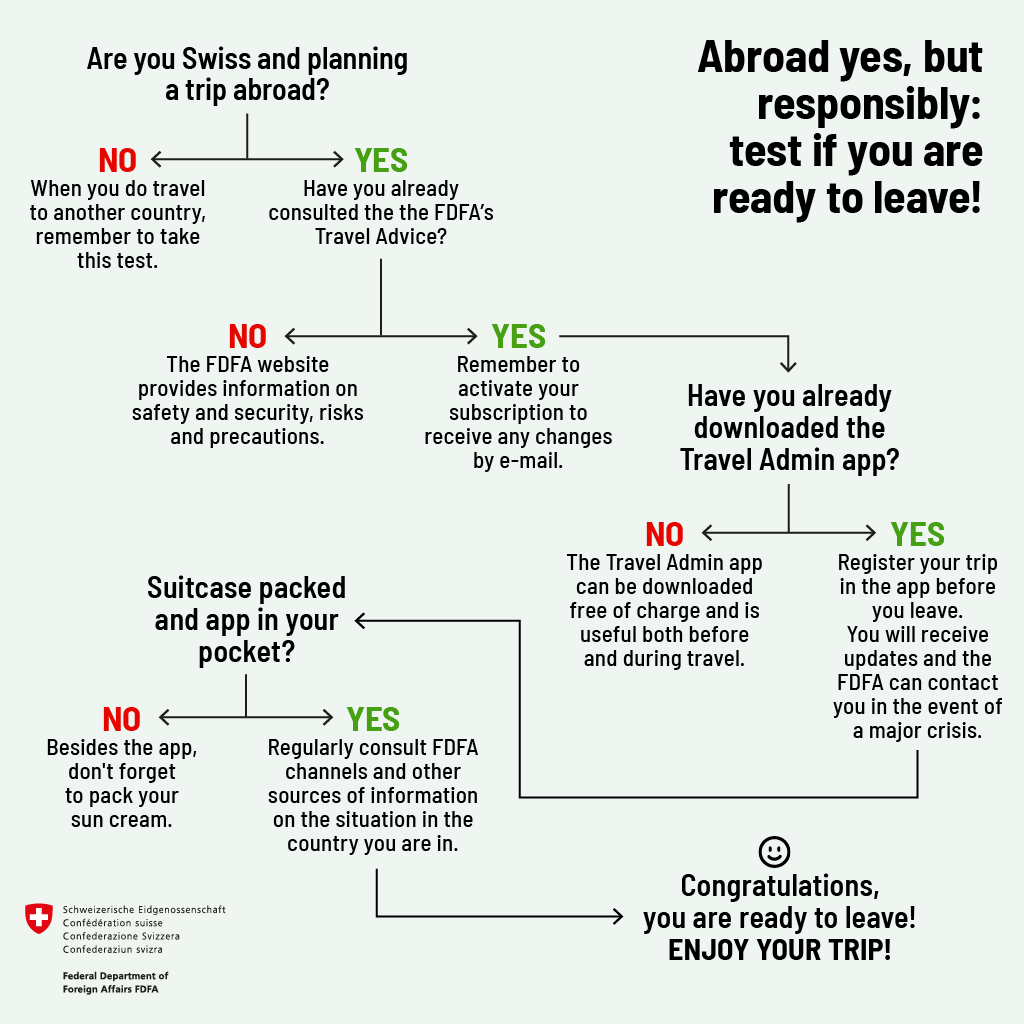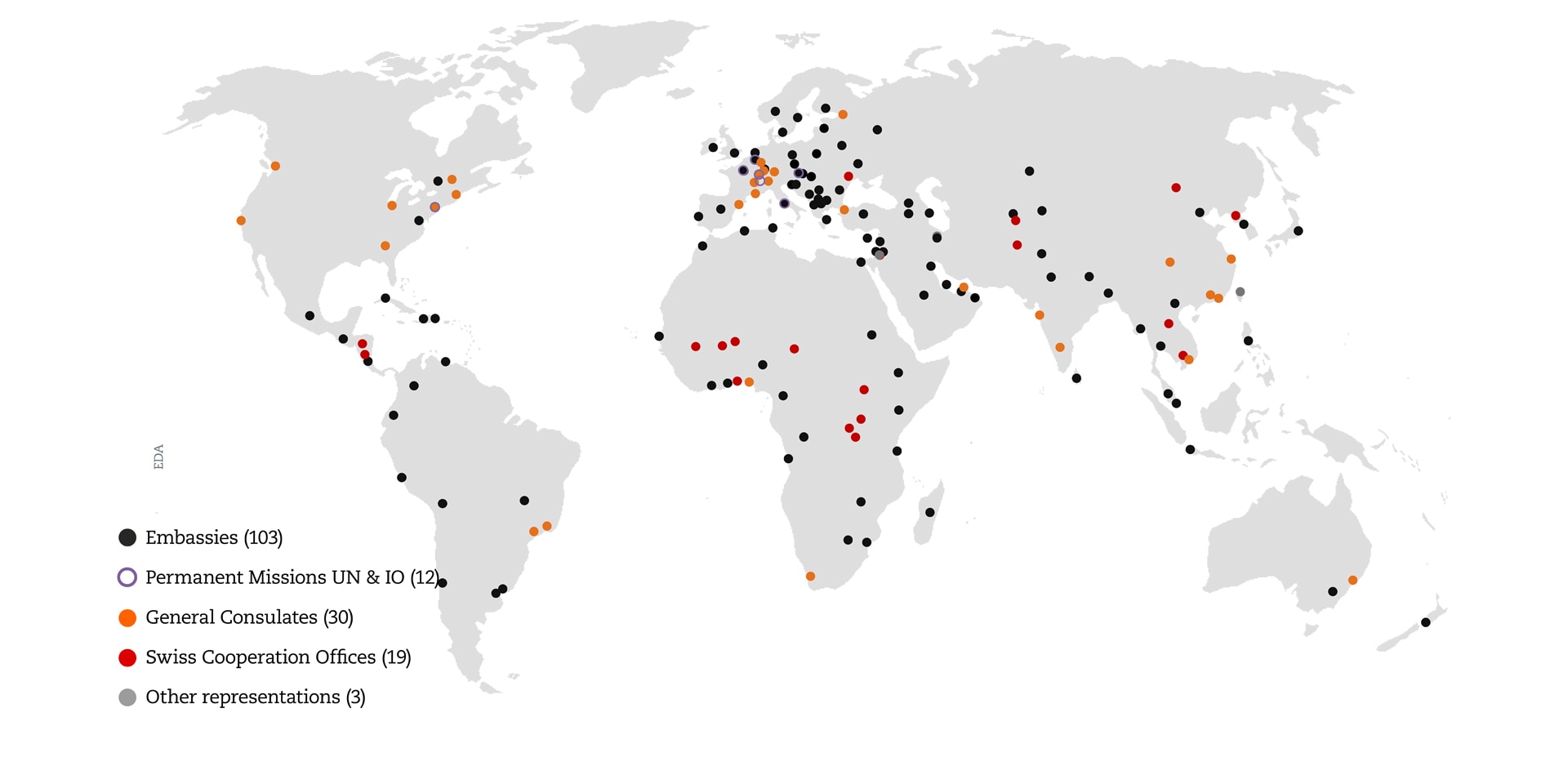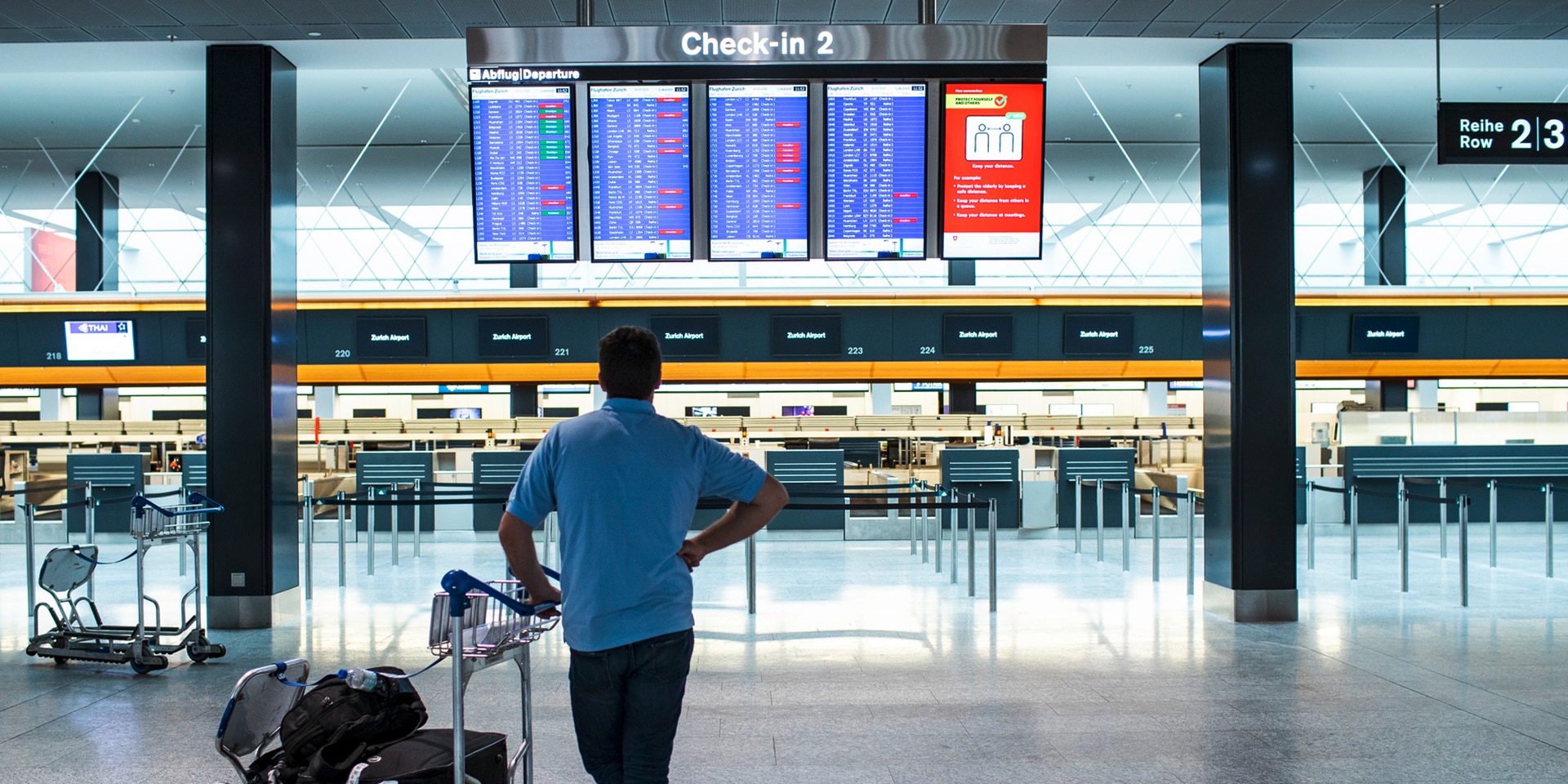Enjoy your time abroad, but travel responsibly
Are you a Swiss citizen abroad and you can't go back to Switzerland because you've contracted the coronavirus or had an accident? Dealing with the unforeseeable will be easier if you've prepared your stay well. You've got to take on personal responsibility if you want to have a great trip. What steps should you take before going abroad? Here are some tips to avoid nasty surprises.
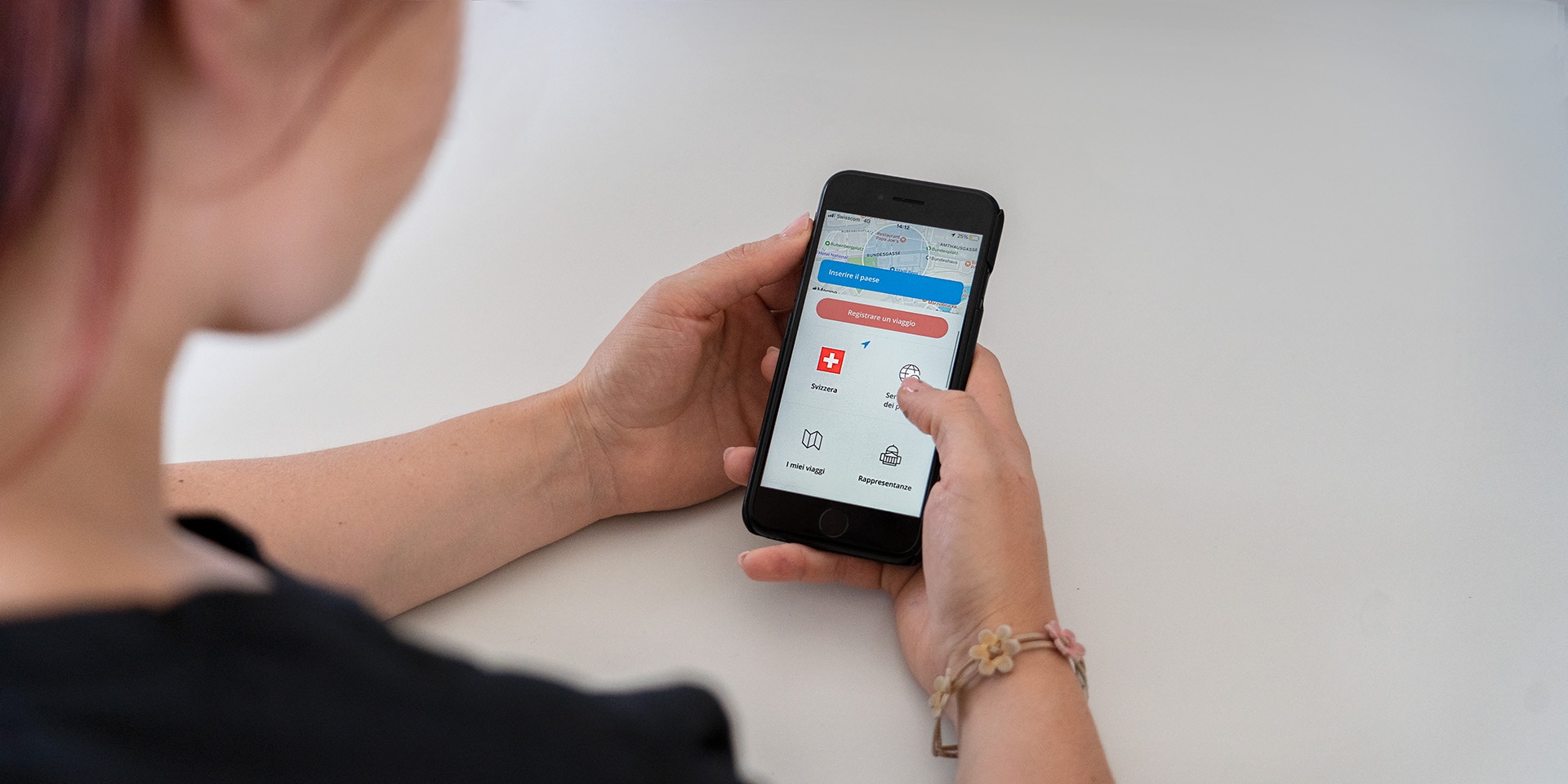
You can download the Travel Admin app free of charge from the App Store and on Android devices. © FDFA
Travel and Coronavirus
The FDFA has compiled a list of the most frequently asked questions and answers on the subject. The Federal Office of Public Health (FOPH) provides information on entering Switzerland and on what you need to consider before, during and after your trip. The measures and recommendations in force in Switzerland and in the countries of destination must be observed when travelling abroad. Please also consult the Focus Coronavirus page before your departure.
Our planet's surface area is 510.1 million km². Subtracting the total area of Switzerland – 41,291 km2 – leaves about 509.9 million km² of the world to be explored. So it is not surprising that according to the Federal Statistical Office, despite the COVID-19 pandemic almost half of all overnight trips taken by Swiss citizens in 2020 were to a foreign destination. With Swiss citizens travelling abroad so much, the FDFA's Consular Directorate calls on every traveller to take on personal responsibility.
Good preparation is indeed important, be it for a weekend in Paris or Rome, a trek in the equatorial jungle or a trip to Tokyo for a cultural festival. The Swiss Abroad Act explicitly states that each person is responsible for preparing and undertaking their (work) stays abroad. Still, the FDFA does help travellers with these tasks by providing up-to-date information and maintaining the FDFA Helpline as a point of contact for questions. This is how the Federal Council and the Federal Administration inform citizens transparently of the steps to be taken, even while they are travelling. In addition to providing consular services, the Consular Directorate (KD) – on behalf of the Confederation – also informs the Swiss abroad of their rights and obligations.
A winning trio: mobility, safety and personal responsibility
If you have an emergency abroad, the Confederation will support you within the scope of consular protection. Yet you will only receive this support if you have already done everything you can on your own, organisationally and financially (principle of subsidiarity). Moreover, there is no legal entitlement to consular protection. In a nutshell, having a Swiss passport does not automatically give you the right to receive this support. To avoid any unpleasant surprises, make sure you complete the following three steps, no matter whether your trip is short or long or to a neighbouring or distant and/or stable or risky country.
- Check the FDFA's travel advice, which features information on safety, politics and crime. The travel advice contains a risk assessment and recommends certain precautionary measures. With the free email subscription to this travel advice, you can stay up-to-date on any changes.
- Download the free Travel Admin app, which provides the best support you can get in preparing your trip as well as useful information and services for travellers. If you register your own trip in the app, the FDFA can send you specific information and, if necessary, contact you if there is a serious crisis where you are.
- Get information from other sources: international and local media provide daily news, as do tourist offices and local hotels. Health care professionals and vaccination centers can tell you about the spread of diseases and what you can do to protect yourself.
Some figures from the Consular Directorate
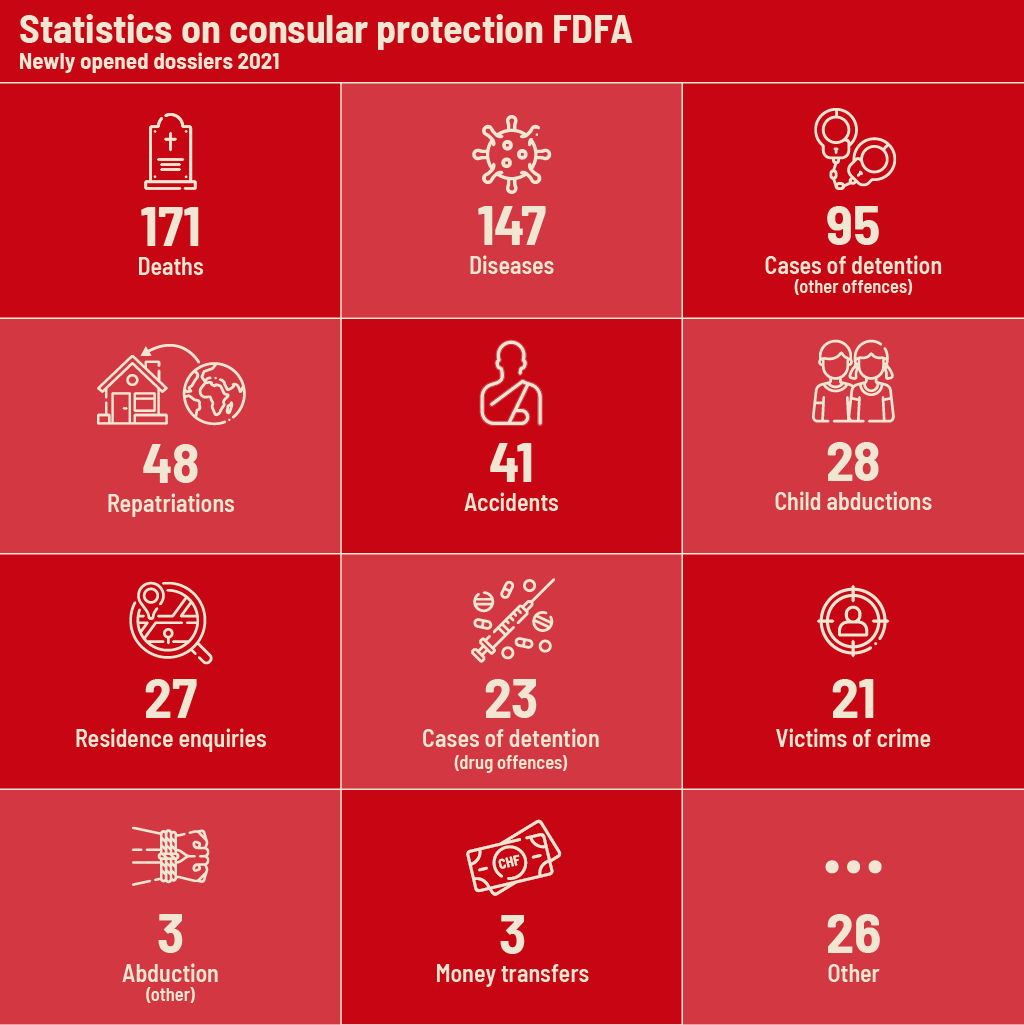
FDFA consular protection staff opened a total of 633 dossiers in 2021. These included, for example, support in 118 cases of detention, and 41 accidents.
Social assistance for Swiss citizens abroad
The Confederation provides assistance to Swiss citizens abroad not only in the event of an emergency. Under certain conditions, it can provide social assistance to Swiss citizens abroad who are at risk of falling into poverty. Like consular protection, this type of assistance can only be provided on a subsidiary basis: in principle, only if the person concerned is unable to support themselves on their own or with the help of private individuals or the state.
After having increased by 20% from 2019 to 2020, last year's statistics on social assistance for Swiss citizens worldwide returned to pre-pandemic levels, decreasing by 16% from 460 cases (2020) to 387 cases (2021). Interventions abroad contributed the most to this trend: there were 79 fewer cases in 2021 than in 2020, of which just under half were COVID-19-related. By contrast, emergency loans increased in 2021 (+56%). In addition to these figures, there were the requests for information that did not lead to dossiers being opened. The number of these requests remained relatively stable, at 167 in 2020 and 154 last year. In 2021, they generated costs totalling CHF 1.1 million.
What not to do
The Canadian poet Anne Carson wrote that the only rule of travelling is to not come back as you left. But what if it were not possible to come back? It wasn't for Mr D., for example, a 24-year-old Swiss citizen who went to Brazil with his girlfriend S. They had all kinds of experiences in South America – bathing under the Iguazu Falls, hiking in the Amazon, sunbathing on Ipanema beach, etc. When they ran out of money, they turned to the Swiss embassy there, but asked that only S.'s father be contacted. The father sent enough money for them to buy food, but could not afford the plane tickets for their return trip. Moreover, D. and S. were in the country without a visa and had to pay a fine. The representation helped them deal with this emergency by granting them an emergency loan – to be paid off – that covered the cost of the flight.
A continent away, the landlord of Mr P.'s lodging contacted the Swiss embassy in the Philippines, informing it that his tenant was in bad health and had stopped paying the rent. The representation contacted P. and various enquiries revealed that the Swiss citizen had been in the country illegally for over four years. He now urgently needed treatment in a hospital. Yet P. had spent all his money in the Philippines, was eligible for neither an OASI nor an IV pension, and was not covered by health insurance that could vouch for the costs of a stay in a hospital. The Consular Directorate looked for relatives of P. in Switzerland and for information, which was no small task, given all the visits to and requests made of the immigration authorities, the hospital, the landlord, etc. The Consular Directorate eventually found a bank account for which P.'s almost 90-year-old mother had a power of attorney. In addition to hospital expenses, this account was used to pay the fine for P.'s four-year illegal stay and to buy him a ticket to Switzerland.
Test: you've packed your suitcase and installed the Travel Admin app, but are you really ready to leave?
D., S. and P. were irresponsible, but without the Consular Directorate's help their adventures could have had an even less happy ending. Don't be like them. In view of this year's summer holidays, find out whether you are ready to leave by answering these questions.
